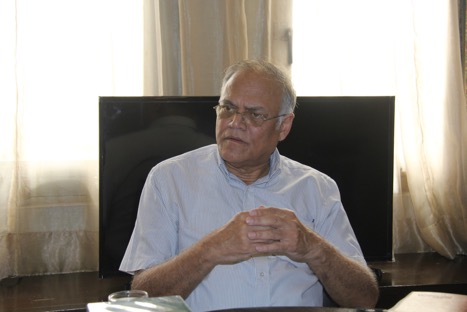
Javed Jabbar, former federal minister of Pakistan, was interviewed by Chinese media representatives in Karachi, Pakistan. (Photo: Ji Peijuan)
Karachi (People’s Daily) -“Everyone wants to have good relations with China. They all welcome the China-Pakistan Economic Corridor (CPEC),”Javed Jabbar, former federal minister of Pakistan, said in an interview with Chinese media representatives in Karachi, Pakistan, on July 31.
Jabbar explained what makes up the CPEC to the five Chinese journalists, who visited Islamabad and Karachi from July 29 to August 2:
“The CPEC projects have three parts. First, it helps Pakistan develop its power sector which generates electricity. Second, it contributes to infrastructure construction, including building roads, improving railways, and promoting connectivity within Pakistan and between Pakistan and China. The third part is about creating special industrial zones where China, Pakistan and other countries can jointly invest, create industries and offer jobs to the local people.”
Jabbar said that 70 percent of the total amount is going into the energy sector where Chinese enterprises will come in and offer assistance through building partnerships with Pakistani companies or overseas companies.
The remaining 30 percent will be divided between infrastructure that includes new roads, highways and motorways. It aims to improve existing roads and to shorten distances between places for quicker transportation. It also covers the improvements in the Gwadar Port and airports.
Jabbar emphasized that more details surrounding CPEC should be more openly released to the public.
“Why don't you set up a 24-hour news television channel on the CPEC just to let people know that we are doing this work here,” said Jabbar. “Conduct interviews with people. Show the engineers working and show the work as well. Say this is the money invested by China. There is a lack of information flow.”
Jabbar explained this was also because of the rivalry between political parties. There are so many parties in Pakistan that the opposition party always criticizes the ruling party and says whatever they're doing is bad for the country.
“But all of the three major parties are very supportive of China. They said any cooperation with China is good for Pakistan,” Jabbar said. “So there is consensus, but there is also criticism on some details. Because one party may be strong in some villages and they want the CPEC to benefit their villages rather than others. So they've been saying you must divert money to our province, otherwise it is not going to benefit Pakistan. This has caused a lot of confusion and misunderstanding. So the media should ensure that the correct picture is presented.”
When asked, Jabbar provided more suggestions to help focus where CPEC can be more-precisely reported on in his country.
First, more information should be given to the media, and more visits to these projects should be organized. The visits will show people that this is the work being done, and they will understand the advantages for the people of Pakistan.
For example, in Southeast Pakistan, right next to the border between Pakistan and India, there is the fifth largest coal deposit in the whole world. A company called the Sindh Engros Coal Mining Company has gone in with China to create an electricity plant.
Now most people in Pakistan thought all the workers were Chinese, but that’s not true. When Jabbar visited, he saw about 500 out of the 4,000 workers were from China, and they were all technical people, like supervisors, engineers or senior managers. Most of the labor was from that area or other parts of Pakistan. The company took journalists to visit and the journalists realized that what they had been given before was misleading information. The fact is that the project had been so well organized by the Chinese and the Pakistanis that they had achieved their target four months ahead of schedule.
Second, people living in the cities of Karachi and Islamabad are not used to visiting villages by highway, and they should be encouraged to travel to the site and see for themselves.
“Everyone wants to have good relations with China and they welcome CPEC. The real challenge is for Pakistan to improve our level of efficiency and our speed of work. We have to do a lot better. We have to coordinate among the local government, provincial government and the federal government. That coordination has to improve. And if that improvement takes place, the projects can be implemented on time to the satisfaction of China and Pakistan,” said Jabbar.


